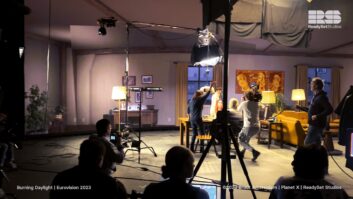The second part of TVBEurope’s MediaTech 360 Summit featured discussions on virtual production, the digital adoption of TV, and why it’s important for those already in the industry to encourage the next generation.
Day two began with a fireside chat with cinematographer Greig Fraser, whose work includes Zero Dark Thirty, The Mandalorian and the upcoming The Batman.
Speaking to TVBEurope’s editor Jenny Priestley, Fraser discussed the adoption of virtual production by content creators, which isn’t quite as recent as many would think. “Rogue One and before it, the film Oblivion; the LED work on those films proved to people how important ‘light’ is to making believable movies,” Fraser says. “When you get the light right, you get 80 per cent of the job done.”
Asked how the cast and crew of The Mandalorian reacted to the new way of working on set, Fraser said: “Virtual production took a lot of getting used to for actors on set, to them, the perspective doesn’t look right, but the camera is correct. But then they watch the the image, and they thought it was fantastic.”
Fraser explained that he enjoys using technology in his work, but doesn’t want to be pigeonholed as the as the go-to cinematographer for virtual production. “For me, having developed that skill is really important, and being able to speak with knowledge to directors, producers, itself, is really important to me.
“I don’t necessarily want to be just a virtual production DP, that’s not my plan. I want to do drama, I want to do interesting films. But this tool is not just another small screwdriver in the toolbox. This is an incredibly powerful, motorised tool that will do a lot of heavy lifting in the future.”
Epic Games’ Ben Lumsden then joined the discussion, and explained how virtual production could lead to a boom in people making films in their bedrooms: “In-camera visual effects is a sub-set of virtual production, which has very much been made possible by computer game technology – graphics cards, LED pixel pitch, etc,” he explained.
“We’re going to see a whole lot more bedroom creators thanks to the democratisation and diversification of storytelling.”
“I’m excited about what will happen – not when big movies get hold of the technology – but when students, photographers, small films,” added Fraser. “When people with limitations get hold of the technology, it’s going to create some incredible results.”

The future of TV and monetisation for the digital realm
The next panel featured Google’s head of broadcast partnerships for the UK and Ireland, Justin Gupta.
He talked about the personalisation of content, and how it’s now possible to personalise advertising. Gupta explained most set top boxes and TVs are internet connected these days which brings further possibilities to customise ads or content.
“One way that digital can help is in maximising audience reach, especially with the 16 to 34 and younger audiences,” said Gupta. “One example [of how important this audience is to broadcasters] is the return of BBC Three to linear in early 2022.
He added that the UK has jumped forward three to five years in terms of digital adoption of TV, but the same trend is happening everywhere.
Rise Up!
The final panel of MediaTech 360 Summit featured women’s advocacy group Rise, and a discussion on education, mentoring, and promotion in broadcast.
The panel discussed the need to educate young people on the opportunities available behind the camera in the TV and film industries. Polly Hickling, course leader, media technology at Solent University said the emphasis on what career people are going to do happens early on. “One of the issues is that all the different types of career are not exposed to the different age groups. There’s a lot that people generally don’t know about.”
Stefania Popescu talked about her experience in taking part in the Rise mentorship scheme. She said her mentor helped her be more confident and not take things personally. She is now a mentor on the Rise Up programme.
This was a point Stephen Stewart, COO at Take 1 Script Services agreed with, stating that the job of a mentor was to instill confidence in his mentee. He says the mentors are there to guide, help and empathise.
He also gave the audience a piece of advice: “You should never lose touch with the people you start out with. Keep in touch, because who you know can help open the door in the future.”
Hickling added that it’s no secret that the industry has a real issue with how many people are coming into the industry. “Job roles are changing and we don’t have enough people to fill them,” she said. “We need more exposure of these roles. We need to emphasise at early education stages that networking doesn’t mean just computers – it’s broadcast as well.”
Videos of all the MediaTech 360 Summit panels will be available to watch on catch-up from 29th March.







